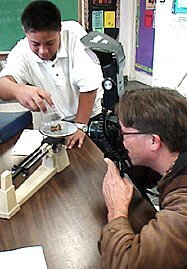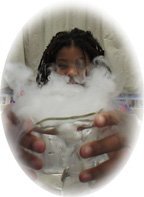Marion Brady offers us some words to chew over this morning:
Kids can't be taught to think better using tests that can't measure how well they think.
The logic should be obvious. What gets tested gets taught. Complex thinking skills -- skills essential to survival--can't be tested, so they don't get taught. That failure doesn't simply rise to the level of a problem. It's unethical.
This is the reason so many of us are so fed up that we will take our own money and time to go to Washington, DC, next week to protest.
Test-based accountability has taken our schools and made it their central mission to increase test scores. No Child Left Behind did this through labeling of entire schools as failures, and the Obama administration has doubled down, demanding that states tie teacher pay and evaluations to test scores.
Teachers are in an inescapable ethical bind. We know that the tests do not measure critical thinking.
As a science teacher, I believe that the essence of science is the exploration of the natural world. It is all about inquiry - asking good questions, and then using all the tools we can muster to investigate and answer those questions. To get a student to behave as a scientist, the key is to put them in the role of a scientist. Challenge them with open-ended questions. Find out what THEY are curious about and inspire them to wrestle with that so they can truly understand it.
Great teaching is about provoking curiosity among our students, and then using that innate inquisitiveness to drive learning in a discipline. I think this is true for every subject, not just science. Great history teaching is about provoking student curiosity about the past, and getting them to investigate the evidence to develop explanations of what really happened and why. Great math teaching is about delving into puzzles of one sort or another, helping students understand clever ways to manipulate numbers to do wonderful things. And English teaching at its best is provoking students to read, to wonder, and to express themselves in ways that can be shared with others.
In each case, this provocation works best when it is driven by spontaneous discovery and innovation. The best teachers are constantly scanning the environment for hooks that we can use to catch student interest. I remember one year we were studying insects and a student brought in a particularly large potato bug. I created a challenge on my web site - could anyone find one that was bigger? We even had a visit from the local newspaper as a result.

I used explorations with dry ice to drive a whole series of investigations, getting students to come up with their own questions as the basis for our investigation.

The objective with this approach is to get students to develop their ability to ask good questions, to design thoughtful experiments that will yield solid data, and to explain their results, using evidence from their research and experimentation. This is critical thinking applied to science.
I have not seen a standardized test that measures this. Instead we get questions that are best prepared for by memorizing things in one way or another. There is nothing inherently wrong with memorization. There is nothing wrong with learning much of what is tested. But it is not our highest calling as teachers. It is not the reason I became a teacher. And when it is defined as our goal, it systematically devalues and undermines the sort of learning I have described here.
That is why I am standing up at the Save Our Schools March on July 30th, with as many of my colleagues and allies I can gather. Please join us!
What do you think? Do high stakes attached to standardized tests put teachers in an ethical bind? How can we respond?
[Editorial note: Education Week Teacher is not affiliated with the Save Our Schools event; the views expressed in this opinion blog do not reflect the endorsement of Education Week or Editorial Projects in Education, which take no editorial positions]
Images by Anthony Cody, used with permission.

